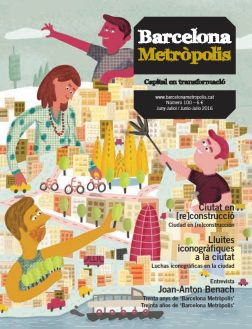 Poesia Contracultura Barcelona (Barcelona Counterculture Poetry)
Poesia Contracultura Barcelona (Barcelona Counterculture Poetry)
Editors: David Castillo and Marc Valls
Barcelona City Council
Barcelona, 2016
400 pages
‘Poesia Contracultura Barcelona’ enables us to enter a time and some works of writing that fought against everything, and even worked to their own detriment. This is the risk of taking on poetry as a way of life, as a form of anger, in a way that could be understood as an act of immolation.
Authentic poetry, which is indomitable and cannot be domesticated, should always be understood as countercultural in character: when that which is stubbornly defended is a wild freedom, a moral and creative independence is achieved that opposes prevailing fashions and the commands of the most powerful from their seats of power. This is because, whether we like it or not, poetry invariably orbits around very strict, entrenched boundaries. In other words, it puts up a slow and invisible yet relentless fight. Because, one way or another, the mythical verse of Hölderlin, repeated ad nauseam, is quite true: “Poets establish that which endures”.
It is high time that we started to revise, revisit, reassess and renew the legacy from years not that far gone by yet still relatively unknown. Hence the value of the anthology Poesia Contracultura Barcelona, adeptly edited by David Castillo and Marc Valls and published with remarkable success by Barcelona City Council. This volume enables us to enter a time and some works of writing that fought against everything, and even worked to their own detriment. This is the risk of taking on poetry as a way of life, as a form of anger, in a way that could be understood as an act of immolation.
That is because we are talking about a collective sacrifice, or at least that is what these pages of sullen happiness speak of. These are pages for experts in literary historiography, but also for curious beginners eager to discover material that is new, secret, valuable and that would be inaccessible without this manual. In the epilogue to this anthology of eternal bastions, the iconic Joan Vinuesa speaks of these often re-read authors as “cursed and bold”, “the chosen ones of the gods”, “unaware and brave”, the “delirious volunteers”. Different yet fitting ways to describe angels of fire who collectively constitute a forbidden caravan of individual Christs, people who through their intensity and brutality decided to go beyond established limits and make them a little more liveable and possible for those who would follow. They accomplish all this through a challenging and vivid poetry that still palpitates and crackles. It is not death that the book speaks of, but life and its triumph, as depicted by the anthologists of these flamboyant beings.
They were, and still are, Albert Subirats, Pau Maragall, Pepe Sales, Jordi Pope, Jaume Cuadreny, Pere Marcilla, Xavier Sabater, Roberto Bolaño, Raúl Núñez, Mònica Maragall, Leo Segura, Zane Speer, Jordi Carbó, Carlos Iguana, J. Daniel Vidal, Sebastià Roure, Piru Cirugeda and Genís Cano. Individuals greatly remembered by those who remain, another long caravan of distinguished contributors who have helped consolidate this formidable collection of poetic memory: the aforementioned Vinuesa, Enric Casasses, Lina Giralt, Lulu Martorell, Pau Riba and Jesús Lizano, who returns from the dead to once again verify the curvature of the universe.
The only thing about this essential book (much more than a stack of bound pages) that merits criticism is the hysterical portrait of a period. Such an epiphanal and memorable volume as this should be two or three times longer, because the selection is careful, thorough, sensational. It is so good because it enables us to relive some of the sparks from that great ritual fire that still burns, so that those of us still amongst the living finally understand that true, powerful poetry really is the foundation of new eras, that it is an eternal countercultural attack that will progressively take its rightful place by incessantly insisting until the ashes light once again to give off their own heat.



